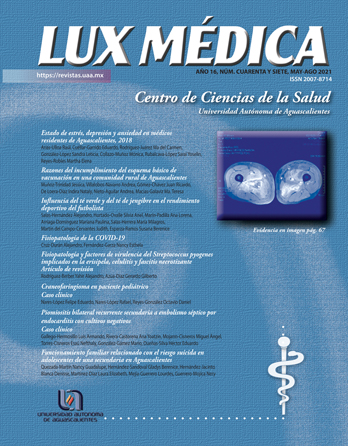Reasons for non-compliance with the basic immunization schedule in a rural community of Aguascalientes
DOI:
https://doi.org/10.33064/47lm20213149Keywords:
Immunization, Immunization schedule, rural communityAbstract
Introduction: Mexico has had one of the most complete immunization schedules in Latin America, and its success is undeniable. Currently, non-compliance with the basic immunization schedule is a serious problem that has increased the incidence of vaccine-preventable diseases, impacting the increase in the rate of morbidity and mortality in children under 5 years of age. Objective: To reveal the reasons for non-compliance with the basic immunization schedule in a rural community of Aguascalientes. Methods: This was a qualitative study carried out in a rural community of Aguascalientes during September-December 2019; through a semi-structured interview with mothers of children with incomplete basic immunization schedules, reaching theoretical saturation with 11 of them. Results: Seven categories were identified that influence non-compliance with immunization schedules: related to the mother, the minor, cultural, geographic, economic, institutional, and health staff. Conclusion: The reasons expressed by the mothers were diverse, and many were referred to in previous studies, standing out in this research, and the main reason identified was the lack of interest in their compliance. Failure to comply with the basic immunization schedule is a multifactorial phenomenon where health education is essential for its resolution. In a rural community, its population becomes more vulnerable, that is why it is necessary to intervene in the identified reasons.
Downloads
Metrics
Downloads
Published
How to Cite
Issue
Section
License
La revista Lux Médica está bajo una licencia de Creative Commons Reconocimiento-NoComercial-Compartir Igual 4.0 Internacional.















